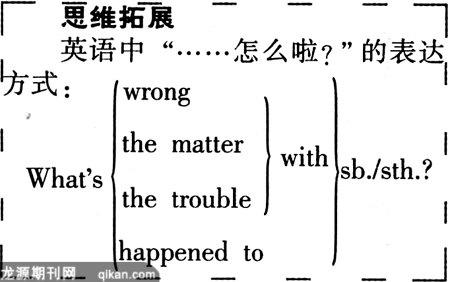八年级(上)Units 1—2中考考点梳理
考点1. how引导的特殊疑问词组
——____ do you visit your
grandparents?
——Once every two weeks.
A. How long B. How soon C. How much D. How often
解析:D 根据答语Once every two weeks“每两周一次”,可知问句问的是动作发生的频率,应用how often,故选D。
思维拓展
①how often通常用来询问动作发生的频率,答语一般用once“一次”,twice, three times a day“一天(两、三)次”,sometimes“有时”,never“从不”,very often“经常”等。
②how long主要用来提问时间的长短,答语通常是一段时间,如:two weeks/months/years等,也可以用来询问某个物体的长度。
③how far“多远”,对距离提问。
④how much用来提问不可数名词数量的多少或对价格提问。
⑤how soon用来询问“需要多长时间,过多久”,谓语动词多用终止性动词,即某一动作要多长时间以后才能完成或发生,时态多用将来时或含将来意义的其他形式,答语常用in a week或in a month/year等短语。
单项选择
1. ——____ have you worked
here?
——Twenty years.
A. How long B. How soon
C. How often D. How many
2. ——____ is it from your
home to school?
——About two kilometers.
A. How far B. How long
C. How soon D. How often
3. ——____ are these dresses?
——Twenty yuan.
A. How much B. How many
C. How often D. How long
知识探究
how many意为“多少”,其后要加可数名词复数形式;how much也意为“多少”,其后要加不可数名词。how many与how much的共同点是它们都是对数量进行提问的常用语。例如:
——How many books do you have?
——Three.
——How much milk do you want?
——A kilo.
考点2 some time, sometime, sometimes, some times的区别
He ____ watches TV.
A. sometimes B. sometime C. some time D. some times
解析:A 本句考查频率副词sometimes的用法,它用来修饰动词watches。
思维拓展
①sometimes的意思是“有时候”,是表示动作发生频率的副词。
②some times的意思是“几次”,表示动作发生的次数。
③sometime的意思是“某时;曾经”。
④some time的意思是“一段时间”。
单项选择
1. I ____ stay in bed until
lunch time.
A. sometime B. sometimes
C. some time D. some times
2. Kate will be back ____ in
February.
A. sometime B. some time C. sometimes D. some times
3. I have been to Beijing
____.
A. some times B. sometimes
C. sometime D. some time
4. It took me ____ to finish
the work.
A. sometimes B. some time
C. some times D. sometime
考点3 情态动词can,may与must的区别
The light in the office is off. The teacher ____ be there now.
A. may B. cant
C. musnt D. must
解析:B 本题考查情态动词的用法及句意的理解。句意为:办公室的灯关了,老师现在不可能在那儿。may是情态动词,表可能性;must意为“一定”,must be表肯定推测;mustnt意为“不许可,不应该”;cant是can的否定式,意为“不会,不可能”。A、C、D放入句中都不符合题意。
单项选择
____ she is at home.
A. Maybe B. May be
C. May D. Can
知识探究
maybe和may be都可意为“或许”“可能”,用于表示推测;不同点:maybe是副词,在句子中不能充当谓语动词,而may be 在句子中可独立充当谓语。
考点4由look构成的不同短语的区别
Janes mother was ill yesterday,so she had to look ____ her.
A. at B. for
C. after D. out of
解析:C 本题考查固定词组look after, 意为“照看;照顾;照料”,相当于take care of。
思维拓展
①look at意为“看……”。
②look for意为“寻找”。
③look after意为“照看”。
④look out of意为“向……外看”。
⑤look like 意为“看上去像……”。
单项选择
1. ——____ does your teacher
____?
——He is tall and he has
brown hair.
A. What; look like
B. What; like
C. How; look like
D. How; like
2. I cant find my pen. Please
help me to ____ it.
A. look at B. look for
C. look after D. look out of
3. ——Tom, dont ____ the
window. Its dangerous.
——OK, Mom.
A. look for B. look at
C. look out of D. look like
考点5 ill与sick的区别
Im going to visit the ____ teacher who has been ____ for
several days.
A. ill; sick B. sick; ill
C. well; ill D. ill; ill
解析:B sick与ill二者意思虽相同,都可意为“生病的”,但sick常作定语,而ill常作表语。ill还可意为“坏的”。well表示“好的”,与题意不符,故C是错误选项。teacher是名词,前面要用定语来修饰,因此第一个空填sick。第二个空前是系动词be,因此要用形容词作表语,故填ill。句意为:我打算去看病了几天的老师。
单项选择
He didnt go to school because of his ____.
A. ill B. sick
C. illness D. sicked
知识探究
-ness可做后缀,加在一些形容词的后面构成名词。例如:
kind+ness→kindness(友好;和善)
sick+ness→sickness(病)
polite+ness→politeness(礼貌)
rude+ness→rudeness(粗鲁)
考点6 固定表达Whats the matter?
——Whats ____ with him?
——He has a headache.
A. the wrong B. the matter
C. trouble D. happened
解析:B be wrong with=be the matter/trouble with,表示“……怎么了?”happen需用于What has happened to sb./sth.?句式表达同样的意思,缩写为Whats happened…?介词必须用to而非with。
思维拓展
英语中“……怎么啦? ”的表达方式:

单项选择
1. All of them wanted to know what ____ to him.
A. was wrong
B. was the matter
C. the trouble was
D. had happened
2. Seeing the boy lying on the ground, he went forward an asked if there was ____.
A. something the wrong
B. anything wrong
C. everything the matter
D. nothing the trouble
知识探究
形容词修饰不定代词something, anything, nothing时一般要后置,且形容词前不加任何冠词。例如:
I have something important to tell you. You must come here tonight. 我有些重要的事情要告诉你。你今晚必须来这儿。
考点7 固定短语have a sore throat和情态动词should
——I have ____.
——You should ____ down and rest.
A. a sore throat; lie
B. a throat sore; lie
C. sore throat; to lie
D. a sore throat; lying
解析:A 表示“哪儿不舒服或有什么病”动词用have,其结构为“have+a+病名”。“嗓子痛”要用固定词组have a sore throat,因此可排除B、C。should是情态动词,后面要加动词原形,因此选A,排除D。
思维拓展
在“have+a+病名”结构中,注意a在此不表示数量“一”,而属于不定冠词加名词表示一类事物。
单项选择
1. She should ____.
A. drink some teas
B. to drink some tea
C. drink some tea
D. to drink some teas
2. You should ____.
A. stop smoking
B. to stop to smoking
C. stopping to smoking
D. stop to smoking
3. ——He has a stomachache.
——He ____ eat anything.
A. should B. shouldnt
C. must D. mustnt
知识探究
should是情态动词,是在提出建议时的常用词,后面接动词原形,其否定形式为shouldnt。
山西山阴县第三中学 李育霞

